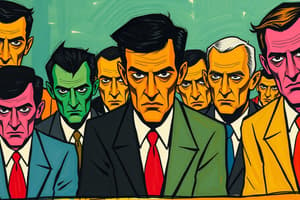Podcast
Questions and Answers
What is the main theme presented in '12 Angry Jurors'?
What is the main theme presented in '12 Angry Jurors'?
- Failure
- Justice (correct)
- Guilt
- Prejudice
What does Juror #3 express about the defendant?
What does Juror #3 express about the defendant?
He believes the defendant is guilty without a doubt.
The jurors' initial vote was unanimous for guilty.
The jurors' initial vote was unanimous for guilty.
True (A)
The phrase spoken by the defendant was 'I'm going to ___ you.'
The phrase spoken by the defendant was 'I'm going to ___ you.'
What is Juror #8's position regarding the trial?
What is Juror #8's position regarding the trial?
Which juror changes their vote to 'not guilty'?
Which juror changes their vote to 'not guilty'?
What reason does Juror #4 give for believing the defendant is guilty?
What reason does Juror #4 give for believing the defendant is guilty?
Juror #8 proposes re-examining the evidence.
Juror #8 proposes re-examining the evidence.
How does Juror #7 feel about the case?
How does Juror #7 feel about the case?
Flashcards are hidden until you start studying
Study Notes
Act One Highlights
- Juror 12 comments on the discomfort of waiting, empathizing with the defendant’s situation.
- Tension arises as jurors question their confinement, reflecting on the seriousness of the trial.
- Foreman demonstrates initial support for the jury system, acknowledging its importance for fairness.
- Juror 8 emphasizes the challenges of the week, suggesting a need for patience and thorough deliberation.
Juror Dynamics
- Juror 3's aggressive stance towards the youth of the defendant showcases his biases and personal conflicts.
- Emotions escalate as jurors express differing priorities and perspectives on the case, clashing over the relevant evidence.
- Conflicting views emerge about the reliability of witness testimonies and recollections, sparking heated debate.
Evidence and Reasoning
- Juror 8 pushes to scrutinize the case further, questioning the validity of eyewitness accounts and the details surrounding the murder weapon.
- The focus shifts to the murder weapon—a unique knife—highlighting doubts about its availability and ownership by the accused.
- Jurors reflect on the gravity of the situation, understanding that a life is at stake and that their responsibility carries serious consequences.
Character Development
- Juror 7 emerges as dismissive and impatient, reflecting a lack of empathy and an eagerness to rush through the process.
- Juror 4 advocates for systematic reasoning, pointing out flaws in emotional arguments made by others.
- The struggle for control within the group highlights individual characteristics and biases, influencing the deliberation process.
Personal Conflicts
- Personal experiences of jurors come to light, revealing how their backgrounds shape their views on justice and guilt.
- Tensions rise as jurors confront their biases and the impact of their beliefs on the defendant's life.
- The theme of class and privilege surfaces, particularly through references to wealth and status in the jury's discussions.
Progression to Act Two
- The jurors face increasing pressure as they begin to confront their preconceptions, leading toward a critical reevaluation of the evidence.
- An urgent need for clarity drives the conversations; conflicting viewpoints create an atmosphere charged with frustration and determination.
- Discussions shift from a simple binary of guilt or innocence to a more nuanced understanding of reasonable doubt.
Resolution and Ongoing Tension
- As votes are cast and changed, the significance of each juror’s stance becomes evident, revealing the intricacies of group dynamics.
- Emergence of a plea for reason over emotion, suggesting an overarching desire for justice rather than merely fulfilling duty.
- The struggles and victories of individual jurors throughout the process underscore the complexity of the justice system and moral responsibility.
Studying That Suits You
Use AI to generate personalized quizzes and flashcards to suit your learning preferences.




